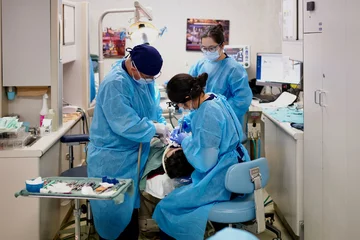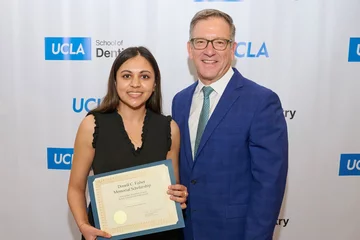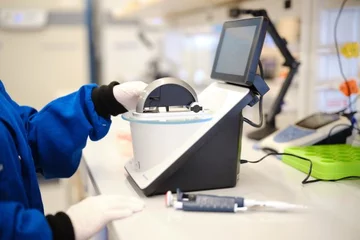Searching for a Cure: Dr. Cun-Yu Wang
Dr. Wang’s research team discovered a dual-target therapy that improves treatment outcomes for head and neck cancer by addressing both tumor cells and resistant cancer stem cells.

“Our discovery could be applied to other solid tumors such as breast and colon cancer, which also frequently metastasize to lymph nodes or distant organs. The translational value and potential of this study’s findings are enormous.”
Head and neck squamous cell carcinoma is a highly invasive form of cancer and the low survival rates have challenged researchers to develop a more effective approach to combatting the disease.
One of the most popular treatments currently being used is the therapeutic drug cisplatin, yet, more than 50 percent of people who take cisplatin demonstrate resistance to the drug, and they experience recurrence of the cancer. Dr. Cun-Yu Wang, a leading oral cancer researcher and a professor of Oral Biology, has made it his mission to understand why people with this type of cancer are resistant to this therapy.
“I believe that the most effective way to overcome cancer resistance and prevent the spread of squamous cell carcinoma is to target the cancer stem cells,” said Dr. Wang, who is also the associate dean for graduate studies. “We’re dealing with the most common head and neck cancer and the second-most common skin cancer. There is an urgent need to develop new approaches for treating it.”
Earlier this year, Dr. Wang and his research team released study findings on what they found to be a more effective method of treating head and neck squamous cell carcinoma (HNSCC). Cancer stem cells are known to be responsible for tumor formation and development; they also self-renew and tend to be unresponsive to cancer therapy. These cells have also been found in HNSCC. The research team’s first approach was to develop a mouse model of HNSCC that allowed them to identity the rare cancer stem cells present using in vivo lineage tracing, a method of identifying descendants of a single cell in tissues.
The researchers found that the cancer stem cells expressed the stem cell protein Bmi1 and had increased activator proteins, which are known to control the expression of multiple cancer-associated genes. Based on this discovery, the team developed and compared different therapeutic strategies for treating HNSCC. They found that a combination of targeting cancer stem cells and killing the tumor mass, which consists of rapidly multiplying cells, with chemotherapy drugs resulted in better outcomes.
The team further discovered that cancer stem cells are not only responsible for squamous cell carcinoma development, but that they also cause cervical lymph node metastasis – the spread of cancer to other parts of the body.
“Our findings are an important step forward to understanding the cellular and genetic mechanisms behind squamous cell carcinoma. Our study shows for the first time that by targeting the proliferating tumor mass and dormant cancer stem cells, with combination therapy, effectively inhibited tumor growth and prevented metastasis compared to monotherapy in mice,” said Dr. Wang, who is a member of the UCLA Jonsson Comprehensive Cancer Center and of the Eli and Edythe Broad Center of Regenerative Medicine and Stem Cell Research at UCLA.



